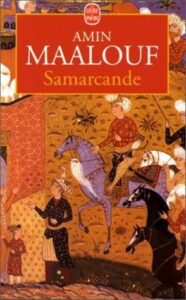Politics as the Means of Escaping from Confinement:
Freedom of Expression in Samarkand
By M. Doğukan Kuru

Set in both 11th century Iran and the modern era, Samarkand is a historical novel by French-Lebanese writer Amin Maalouf. It explores the socio-political struggles of a geography inspired by the Rubaiyat, the collection of poems by the famous poet and polymath Omer Khayyam. The novel is divided into two sections, interconnecting two different eras from the distant and recent past. Revolving around Omer Khayyam and his work, the Rubaiyat, Maalouf’s narration unravels the enduring struggles manipulated by hegemonic powers to suppress individualistic thought for the sake of protectionism and unitarism. The novel presents two timelines: the crumbling Seljuk Empire in the distant past and the westernized monarchy of modern Iran in the recent past, highlighting the cyclical nature of oppression throughout history. Omer Khayyam is the central figure through whom the story unfolds, recounting his personal and political struggles. He criticizes the oppression imposed on the masses while maintaining a pacifist attitude. Reluctant to engage in politics, he finds himself caught between the machinations of two major political figures of the time, Nizam al-Mulk of the Seljuks and Hassan-i Sabbah of the Nizaris. Driven by political power and religious conflicts between sects of Islam, these factions coerce Khayyam to become involved in their politics to eliminate each other. Khayyam, however, seeks a life of freedom to pursue astronomy, write poetry, and love his partner Cihan. He desires no part in politics, especially the destructive kind that targets dissenters. To his dismay, he is left with no choice but to employ his skills as a double agent, yearning to be released from his duties by both sides. However, the price of his freedom is the triumph of one of his employers. Khayyam is informed that he will only be left in peace to pursue his studies and love if he proves useful. Having been assaulted by local thugs due to his controversial thoughts criticizing religious norms in the region, he realizes the need for protection from higher authorities, be it the imperial administration or the rebellious cult. Khayyam’s story embodies the struggle for freedom of thought, which the hegemonic powers exploit as a tool to further their ideologies. The influence of Khayyam’s Rubaiyat endures both in ancient times and the contemporary world. Even today, his provocative philosophy resonates globally. Maalouf’s “Samarkand” showcases the triumph of arts and science against the historical exploitation of ideas. Thoughts should be liberated from the oppression imposed by those in power. They should be free and not be commodified, as they have often been used to exploit others.

